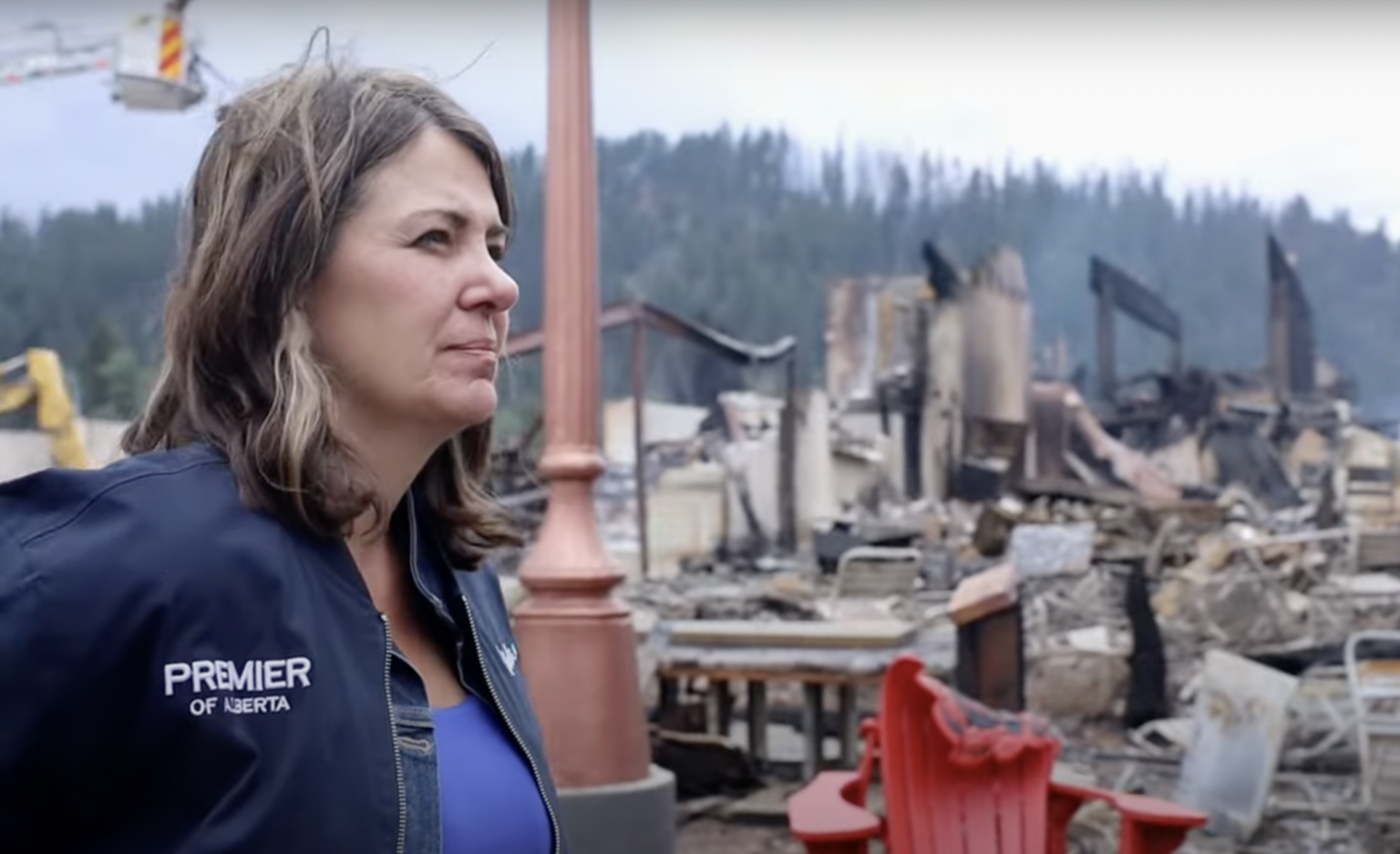Alberta Premier Danielle Smith had to hold back tears during an update about a wildfire that had ravaged the town of Jasper, a historical mountain town in Alberta in the Rocky Mountains.
“For many generations the town of Jasper and the park surrounding it have been a source of pride with some of the most beautiful scenery in the entire world,” said Smith through frequent and emotional pauses.
Smith also praised the “true heroism” of the fire crews who had to confront a 400 foot wall of flames in the national park.
One 24 year old firefighter died after being hit with a falling tree while fighting the blaze.
But this fire, though notable because of the historic value and prized beauty of the Rocky Mountains, was only one out of an increasingly catastrophic series of fires. Slave Lake fires in 2011, Fort McMurray in 2016 and Lytton B.C in 2021 were all evacuated and later forced to rebuild after significant property damage.
In 2023 Alberta saw a record breaking number of fires for a total of 1,092 wildfires burn a record 2.2-million hectares, according to the Alberta government.
Greenpeace Canada, Environmental Defence Canada and Ecojustice are among 80 organizations that have signed an open letter calling on the federal government and other lawmakers to take further action on climate change in the wake of the fire.
But Smith’s government is not making links between the fires and climate change.
“Clearly we are seeing an increase in the number and severity of forest fires in Canada and across the world, as well as other natural catastrophes,” said Todd Loewen, Alberta’s minister of forestry and parks. He was asked about this letter by reporters last week. He said the province has had “two big years in a row.”
“Last year, 2.2. million hectares of land burned in Alberta,” he said, noting that is a provincial record. “This year here, we’ve only had about 25 percent of what we’ve had burned last year,” said Loewen.
But when asked about the leading contributor to warming — fossil fuels, according to the Intergovernmental Panel on Climate Change — Loewen said that the “oil and gas industry in Canada, and particularly in Alberta, is doing a fantastic job when it comes to emissions reductions.”
Blaming Arsonists
On a 2023 episode of the Ryan Jespersen show the host talked about experts on the show indicating that climate change is a significant contributor to massive wildfires while Smith was a guest on the show.
In response, Smith said “I think you’re watching, as I am the number of stories about arson. I’m very concerned about arsonists.”
The Alberta Forestry ministry told Postmedia that 8.4 percent of all wildfires were categorized as arson. That is 91 out of the total of 1,088 wildfires reported in the 2023 wildfire statistics.
In addition to comments about arson minimizing the role that climate change plays in wildfire intensity, Smith has been open about her challenging the federal government when it comes to legislation that affects the energy industry.
In November of 2023, Smith mused about invoking the Sovereignty Act legislation to challenge the federal government’s proposed clean electricity regulations.
The so-called Alberta Sovereignty within a United Canada Act was introduced by Smith as centrepiece legislation that would fight back against the federal government where the UCP considered them to be overreaching into provincial responsibility.
On November 27, 2023 the motion tabled for the Sovereignty Act declared, among other things that, “the Federal Initiative is already having an extreme chilling effect on investment in Alberta’s electricity generation industry, and further, is slowing investments in emissions reducing technology and projects.”
“The Premier’s actions will jeopardize investment certainty, weaken the nation, ignore the rule of law, breach treaty rights across the country and here in Alberta, and declare that we’re on the wrong side of fighting climate change,” NDP opposition leader Rachel Notley said at the time.
Smith has also been opposed to the federal carbon tax, arguing that it has made life too expensive for Albertans.
DeSmog has reached out to Smith about her comments regarding arson and her opposition to the carbon tax.
Disaster Budgets Slashed
Despite the mounting cost and numbers of wildfire events, financial planning did not correlate to the budgeting of disaster funds.
In 2019 there were 883,411 hectares burned according to the 2019 wildfire review.
Yet that same year United Conservative Government cut the budget for the Alberta Rapattack team, whose firefighters were trained to rappel from helicopters to extinguish wildfires while they only covered a few hectares of land.
The Canadian Press reported that the program was cut in 2019 by the UCP, to the tune of saving 1.4 million dollars.
In March 2023, CBC journalist Taylor Lambert dug into the Alberta 2019 Wildfire Review to demonstrate that wildfires are contained overnight 94 percent of time when crews arrive, and the fire is smaller than 2 hectares compared to 43 per cent of the time when the crews arrive and the fire is larger than 2 hectares.
Funding has now been increased for the current financial year, which reversed cuts from both the United Conservative Party and the New Democratic Party that had also slashed the budget.
Subscribe to our newsletter
Stay up to date with DeSmog news and alerts






